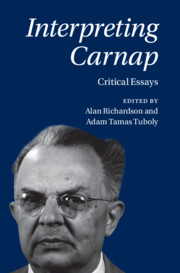Book contents
- Interpreting Carnap
- Interpreting Carnap
- Copyright page
- Contents
- Contributors
- Acknowledgments
- Abbreviations
- Introduction
- Part I Philosophy in New Dress
- Part II Naturalism and Method
- Part III The Logical and the Linguistic
- Part IV Science and Theories
- Chapter 12 Carnap on Theories and the Methods of Science
- Chapter 13 Carnap on Unity of Science
- Chapter 14 Carnap on Determinism and Free Will
- Bibliography
- Index
Chapter 12 - Carnap on Theories and the Methods of Science
from Part IV - Science and Theories
Published online by Cambridge University Press: 01 February 2024
- Interpreting Carnap
- Interpreting Carnap
- Copyright page
- Contents
- Contributors
- Acknowledgments
- Abbreviations
- Introduction
- Part I Philosophy in New Dress
- Part II Naturalism and Method
- Part III The Logical and the Linguistic
- Part IV Science and Theories
- Chapter 12 Carnap on Theories and the Methods of Science
- Chapter 13 Carnap on Unity of Science
- Chapter 14 Carnap on Determinism and Free Will
- Bibliography
- Index
Summary
The propositions of a scientific theory are connected with empirical states of affairs. Determining how theoretical propositions are connected with empirical facts, what Carnap called the “empirical significance” of a theory, is a complex affair. Carnap’s account of the relationship between theoretical frameworks and methods of observation has come in for plentiful criticism, alleging that Carnap’s theory of science does not allow for a sophisticated entwinement of theory and observation, instead favoring heavy formalism and a brittle reductionism. I present evidence that Carnap’s account of the distinction between theoretical and observation languages is more flexible than it is usually depicted to be and is motivated by his philosophy of science. In particular, in his mature work Carnap argues that the "specific calculus" of a scientific theory, including mathematical structure and physical laws, are included in the axiomatic foundations and linguistic framework of that theory. Carnap’s account of language thus turns out to be deeply entangled with his philosophy of science, and one cannot be understood independently of the other.
Keywords
- Type
- Chapter
- Information
- Interpreting CarnapCritical Essays, pp. 237 - 251Publisher: Cambridge University PressPrint publication year: 2024
- 1
- Cited by

